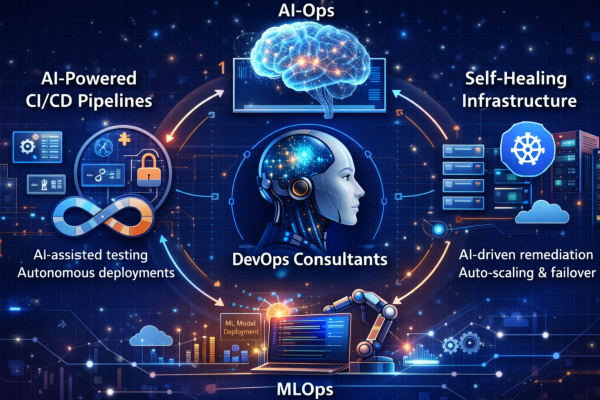How CI/CD Pipeline Services Reduce Deployment Failures and Speed Up Delivery?
In today’s fast-paced technological landscape, businesses rely on the efficient delivery of software applications to stay competitive. One way to achieve this is through Continuous Integration and Continuous Deployment (CI/CD) pipeline services. These services play a pivotal role in reducing deployment failures and accelerating software delivery. A trusted DevOps Service Provider in Mohali ensures the smooth implementation of CI/CD pipelines, enabling organizations to achieve their development and deployment goals seamlessly.
What is a CI/CD Pipeline?
A CI/CD pipeline is a set of automated processes that help software teams deliver code changes more reliably and quickly. CI (Continuous Integration) involves the frequent merging of developers’ code into a shared repository, followed by automated testing. CD (Continuous Deployment or Delivery) automates the release of this tested code to production environments, ensuring that updates are available to end users promptly.
The Need for CI/CD Pipeline Services
Traditional software development and deployment often involve manual processes, which are time-consuming and prone to errors. CI/CD pipelines solve these challenges by introducing automation, consistency, and reliability into the software lifecycle. Here are key reasons why organizations adopt CI/CD pipeline services:
- Frequent Releases: Modern users expect regular updates and new features. CI/CD enables faster and more frequent releases.
- Reduced Errors: Automated testing in CI/CD pipelines identifies and resolves issues early in the development process.
- Scalability: As businesses grow, managing multiple codebases and deployments becomes easier with CI/CD pipelines.
How CI/CD Pipeline Services Reduce Deployment Failures
One of the primary goals of a CI/CD pipeline is to minimize deployment failures. Here’s how these services achieve this:
1. Automated Testing
Automated testing is a cornerstone of CI/CD pipelines. Every code change undergoes rigorous testing, including unit tests, integration tests, and performance tests. This ensures that only error-free code is deployed to production, significantly reducing the likelihood of failures.
2. Early Bug Detection
By integrating code frequently, developers identify and address bugs early in the development cycle. This “shift-left” approach to testing prevents errors from escalating into major issues during deployment.
3. Consistent Environments
CI/CD pipelines rely on standardized development, testing, and production environments. This consistency eliminates discrepancies between environments that could cause deployment failures.
4. Rollback Mechanisms
CI/CD pipelines include automated rollback mechanisms, allowing teams to revert to a previous stable version in case of failure. This minimizes downtime and ensures business continuity.
5. Version Control
Comprehensive version control systems integrated into CI/CD pipelines track changes and maintain a history of modifications. This makes troubleshooting and resolving issues faster and more efficient.
How CI/CD Pipeline Services Speed Up Delivery
Faster delivery is another significant advantage of CI/CD pipelines. With automated workflows and processes, CI/CD eliminates delays associated with manual interventions. Here’s how:
1. Automation of Repetitive Tasks
CI/CD pipelines automate repetitive tasks such as code compilation, testing, and deployment. This frees up developers to focus on more complex and value-driven tasks.
2. Parallel Testing
CI/CD pipelines support parallel testing, enabling multiple tests to run simultaneously. This reduces the overall testing time and accelerates the delivery process.
3. Continuous Feedback
Real-time feedback loops in CI/CD pipelines inform developers of issues as they occur. This immediate feedback allows for faster resolution, keeping the development process on track.
4. Shortened Development Cycles
By breaking down the development process into smaller, manageable cycles, CI/CD pipelines enable incremental improvements and faster deployment of new features.
5. Integration with DevOps Practices
CI/CD pipelines are an integral part of DevOps practices. A reliable DevOps Service Provider can seamlessly integrate CI/CD pipelines with tools like Jenkins, GitLab, or Azure DevOps, further streamlining software delivery.
Benefits of CI/CD Pipeline Services
CI/CD pipelines offer numerous benefits to organizations looking to improve their software development and deployment processes. Here are some key advantages:
1. Enhanced Quality
Automated testing ensures high-quality code by catching errors early. This results in robust and reliable software applications.
2. Reduced Costs
By identifying and resolving issues early, CI/CD pipelines reduce the cost of fixing bugs. Automation also minimizes the need for manual intervention, saving resources.
3. Improved Collaboration
CI/CD pipelines foster collaboration between development, operations, and quality assurance teams. This alignment ensures smoother workflows and better communication.
4. Increased Agility
Organizations can respond quickly to market demands and user feedback, thanks to the faster development cycles enabled by CI/CD pipelines.
5. Scalability and Flexibility
CI/CD pipelines can scale with the growth of an organization. They support diverse environments and multiple teams, making them ideal for enterprises of all sizes.
Key Components of a CI/CD Pipeline
A well-designed CI/CD pipeline includes the following components:
- Source Control: Tools like Git manage code versions and changes.
- Build Automation: Tools like Jenkins or CircleCI compile the code and create executable builds.
- Automated Testing: Unit tests, integration tests, and other automated tests ensure code quality.
- Deployment Automation: Tools like Kubernetes or Docker deploy applications to production environments.
- Monitoring and Feedback: Continuous monitoring tools like Prometheus provide insights into the application’s performance and health.
The Role of a DevOps Service Provider in CI/CD Implementation
Implementing CI/CD pipelines requires expertise and a deep understanding of DevOps practices. A DevOps Service Provider plays a crucial role in:
- Assessing Requirements: Analyzing the organization’s needs and designing a tailored CI/CD pipeline.
- Tool Selection: Identifying the best tools and technologies for the organization’s specific requirements.
- Integration: Seamlessly integrating CI/CD pipelines into existing workflows.
- Training and Support: Providing ongoing training and support to ensure teams can effectively use the CI/CD pipeline.
- Optimization: Continuously monitoring and optimizing the CI/CD pipeline for performance and efficiency.
Challenges in Implementing CI/CD Pipelines
While CI/CD pipelines offer significant benefits, their implementation can pose challenges. Common hurdles include:
- Tool Overload: Choosing the right tools from a plethora of options can be overwhelming.
- Cultural Resistance: Shifting to automated workflows may face resistance from teams accustomed to traditional methods.
- Complexity: Setting up a CI/CD pipeline requires expertise in development, operations, and testing.
- Security Concerns: Automating deployments can introduce vulnerabilities if not properly managed.
Partnering with a reliable DevOps Service Provider can help organizations overcome these challenges and ensure successful CI/CD implementation.
Conclusion
CI/CD pipeline services are a game-changer for organizations looking to enhance their software development and deployment processes. By automating tasks, reducing deployment failures, and speeding up delivery, CI/CD pipelines enable businesses to stay competitive in a dynamic market. A trusted DevOps Service Provider ensures seamless implementation and ongoing support, allowing organizations to focus on innovation and growth.
Embracing CI/CD pipeline services is no longer a luxury but a necessity for modern businesses. With the right strategies, tools, and expertise, organizations can achieve unparalleled efficiency, agility, and reliability in their software delivery processes.
Author







